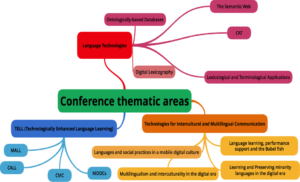Technological Innovation for Specialized Linguistic Domains: Languages for digital lives and cultures
(see a video presentation here: https://canal.uned.es/serial/index/id/5758 ; See CFP in Easychair here: https://easychair.org/cfp/tislid18 )
Deadline extended until January 10, 2018!
The third conference on Technological Innovation for Specialized Linguistic Domains (TISLID 18), Languages for digital lives and cultures, is to be held at Ghent University, Belgium, 24-26 May 2018.
It will be hosted by the Ghent University-based research groups MULTIPLES and LT3 together with the UNED-based ATLAS research group.
This event offers a great opportunity to interchange knowledge and experiences, both in a formal and informal, creative way, regarding language-based digital realities. This new forum aims to promote academic debate on digital language technologies, with a special focus on their potential for promoting communication and (lifelong) learning.
The conference will include keynotes, paper presentations, posters, a roundtable debate (on Thursday and Friday) and workshops (on Saturday).
We welcome the submission of research papers/posters dealing with any of the following thematic areas shown below:
- Language Technologies
- TELL (Technologically-enhanced Language Learning)
- Technologies for Interlingual and Multilingual Communication

Those interested in submitting a proposal should send a 300-500 word abstract (with key references) following the steps outlined in the conference website: https://www.tislid18.ugent.be or by directly clicking on https://easychair.org/conferences/?conf=tislid18
Abstract submission instructions:
- Abstracts should be submitted online via EasyChair.
- All submitted abstracts will undergo double blind-peer review. The abstract should clearly indicate the aims, methods of research and conclusions.
- Abstract text length should be between 300-500 words and should be submitted in English.
- You will be informed by e-mail about the acceptance/rejection of your abstract submission after the peer review process.
Abstract submission via EasyChair: PROCESS OF SENDING YOUR ABSTRACT VIA EASYCHAIR
Step 1: Register first – just click at the “sign up for an account” link at the login page and fill in the form. The system will send you an e-mail with the instructions how to finish the registration.
Should you already have an EasyChair account from a previous conference, use your existing account for this conference.
Step 2: Go to https://easychair.org/conferences/?conf=tislid18.
Step 3: Log in and click NEW SUBMISSION at the top of the page.
Step 4: Fill in the form and submit following the instructions.
NOTE: After submitting your paper successfully, you should receive an e-mail from EasyChair that you have successfully submitted your abstract by copy/paste.
Should you have any queries or problems concerning abstract submission, please do not hesitate to contact us.
Keynote speakers:
Our keynote speakers are excellent communicators and storytellers and renowned for their work, which combines research and development at the forefront of technological and didactical innovation:
- Inge de Waard (Open University, United Kingdom): MOOCs: stuck between realities of informal learning and myths of personalisation
- Aga Palalas (Athabasca University, Canada): Mindfulness for human-centered digital learning
Workshops on Saturday 26th May are open both for academic researchers and foreign language teaching professionals:
- Patrick Goethals (Ghent University, Belgium): Processing language with Python: an introduction.
- Cristina Calle (University Complutense of Madrid, Spain) & Ana Ibáñez (UNED, Spain): New technologies and their application to new trends in language learning: autonomous, collaborative, ludic.
Conference publications:
- Proceedings: All accepted abstracts will be published in the conference proceedings (provided that their author/s send a 2500-3000 word version of the paper within the deadline, which will be announced in due course before the congress).
- Selected papers publication. A selection of the best papers will be published as a separate research book with a major international publisher. The authors in question will be required to submit an extended version of their paper (5000-7000 words) in due course after the congress.
See a sample of previous publications from the TISLID series:
- From TISLID 10: Languages for Specific Purposes in the Digital Era, by Springer (http://www.springer.com/gp/book/9783319022215#otherversion=9783319378503)
- From TISLID 14: Technology-Enhanced Language Learning for Specialized Domains: Practical Applications and Mobility, by Routledge (https://www.routledge.com/Technology-Enhanced-Language-Learning-for-Specialized-Domains-Practical/Martin-Monje-Elorza-Garcia-Riaza/p/book/9781138120433)
Important dates:
-
- Abstract submission deadline: December 10, 2017.
Deadline extended! New deadline: January 10, 2018
- Paper acceptance notification: January 31, 2018.
- Early Bird Registration: March 31, 2018.
- Full paper submission (proceedings): Before May 24, 2018 (to be confirmed).
- Conference dates: May 24-26, 2018.
- Abstract submission deadline: December 10, 2017.
The Organizing Committee is looking forward to meeting you in Ghent. For further information, please contact: tislid18@gmail.com
Honorary President
Brian Holmes, Director of the Executive Agency for Education, Audiovisual and Culture (EACEA) at the European Commission
Organizing Committee
Elena Bárcena (co-chair, UNED)
Patrick Goethals (co-chair, Ghent University)
Ana Ibáñez (co-chair, UNED)
Anna Vermeulen(co-chair, Ghent University)
Extended Organizing Committee
Dirk de Hertog (Katholieke Universiteit Leuven, KULAK)
Marie-Aude Lefer (Université Catholique de Louvain)
Scientific Committee
Jorge Arús-Hita (University Complutense of Madrid)
Cristina Calle (University Complutense of Madrid)
Maria Dolores Castrillo (UNED)
Bernard de Clerck (Ghent University)
Jozef Colpaert (University of Antwerp)
Piet Desmet (University of Leuven)
June Eyckmans (Ghent University)
Agnes Kukulska-Hulme (Open University)
Els Lefever (Ghent University)
Elena Martín-Monje(UNED)
Antonio Pareja (University Complutense of Madrid)
Lourdes Pomposo (University of Camilo José Cela)
Timothy Read (UNED)
Aline Remael (University of Antwerp)
Blanca Riaza (University of Salamanca)
Beatriz Sedano (UNED)
Carola Strobl (Ghent University)
John Traxler (University of Wolverhampton)
Patricia Vanden Bulcke (Ghent University)